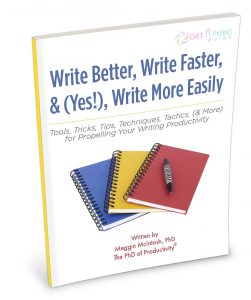10 Common Writing Mistakes That Will Mess You Up by Daphne Gray-Grant
 Today I describe 10 of the most common writing mistakes I encounter every day! Address these issues and you’ll find you write faster and much more easily….
Today I describe 10 of the most common writing mistakes I encounter every day! Address these issues and you’ll find you write faster and much more easily….
- Leaving writing to the last minute. Yes, I know you may hate writing but the smartest writers do all sorts of preparatory work first, to ensure their writing time is as much fun as possible. Think about your topic. (And go for a walk while thinking.) Research. Prepare a mindmap. All of these activities are easy — and don’t even feel like writing! Don’t let the pressure of deadlines force you to write too early. Ensure you prepare.
- Doing an outline. No, no, a thousand times no! Don’t outline before writing. This task takes you into the linear, logical part of your brain when you want to be in the creative part. Instead of making an outline, create a mindmap.
- Starting without a model. Imitation is the sincerest form of flattery! Before you write a word be sure to have a model that you (or your boss) thinks captures the style of what you’re trying to write. As long as you’re only copying the style (and not word for word) you will not be plagiarizing.
- Not being conversational enough. You don’t want to sound like a pompous ass when you write — instead you want to be relaxed and interesting and, dare I say it, fun! Even if your topic is serious, a conversational approach will help your audience understand you better.
- Failing to include stories and examples. Too many writers are in love with the facts and only the facts. Instead, remember that human beings have been telling stories since well before we invented writing! Stories move us and bring us to action. If you’re trying to persuade anyone to do anything with your writing, be sure to tell some stories and anecdotes.
- Editing while you write. Writing is an entirely separate job from editing. Trying to do both at the same time is like trying to clear the table while you are still eating dinner. Instead, write as fast as you can and edit (later) as slowly as you can tolerate.
- Writing sentences that are too long. If you’ve been through higher education you’ve likely been trained to write sentences that are far too long for easy understanding. Use an internet-based tool (I like: http://bit.ly/h1fIO) to determine the average length of your sentences. Aim for 14-18 words per sentence. (NB: This is an average. Some sentences should be much longer and others should be much shorter.)
- Being too sophisticated. Writers who make mistakes 4, 5 and 7, are usually trying to demonstrate their own sophistication to the reader. This is always an error. Instead, you should strive to have your readers engaged and, perhaps, entertained. Never try to make them think you’re smarter than they are. This alienates rather than impresses.
- Not allowing enough incubation time after you write. After you write and before you edit your text should sit quietly on your hard-drive for at least a day before you edit it. (When you get your writing assignment, be sure to schedule this important “waiting” time.) You cannot edit properly without enough distance from your words.
- Failing to proofread. I’m convinced that good proofreaders are born, not made (and, sadly, I was born without the necessary DNA.) But you can be a better proofreader if you take care and pay attention. My favourite trick is switching the type to something unusual (I favour Papyrus), bumping it up several notches (I go for 20 pt.) and then reading aloud. All of a sudden all sorts of previously hidden mistakes jump out and grab me by the eyeballs.
© Daphne Gray-Grant who is the author of 8 1/2 Steps to Writing Faster, Better. Daphne Gray-Grant is The Publication Coach and you can access her book and sign up for her VERY helpful (Meggin’s comment) weekly newsletter at Publication Coach. Writers will find her site, materials, and coaching helpful.
 Whether you write for pleasure, to discover, to get paid, as a part of your work, as a way to instruct, or for any other purpose, streamlining your writing process is essential. The Get a Plan! Guide® to Writing Better, Faster, & (Yes!) More Easily: Tools, Tricks, Tips, Techniques, Tactics, & More for Propelling Your Writing Productivity.
Whether you write for pleasure, to discover, to get paid, as a part of your work, as a way to instruct, or for any other purpose, streamlining your writing process is essential. The Get a Plan! Guide® to Writing Better, Faster, & (Yes!) More Easily: Tools, Tricks, Tips, Techniques, Tactics, & More for Propelling Your Writing Productivity.
Inside this essential Get a Plan! Guide, you’ll find nearly 70 practical, easy-to-implement ideas that will propel your writing productivity.




